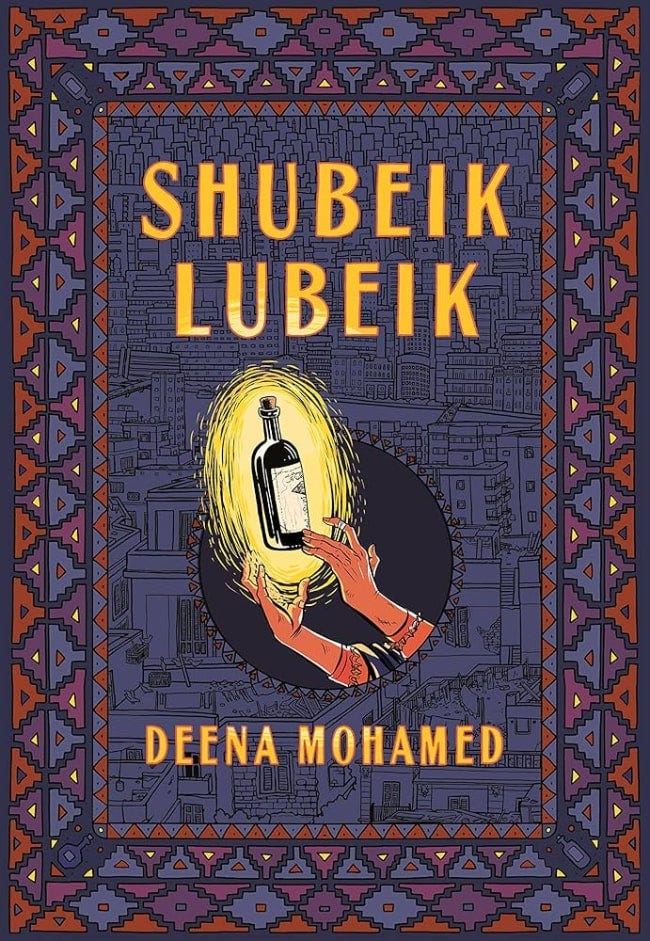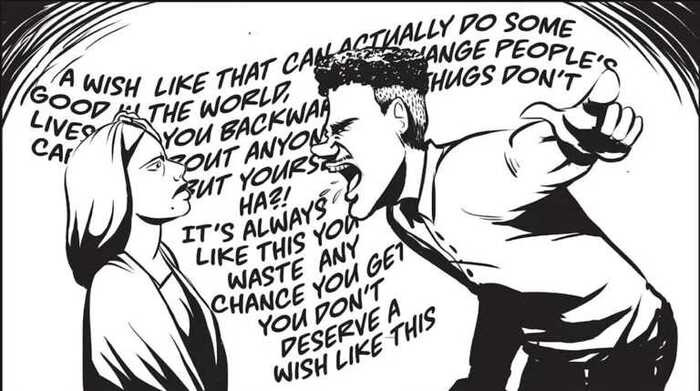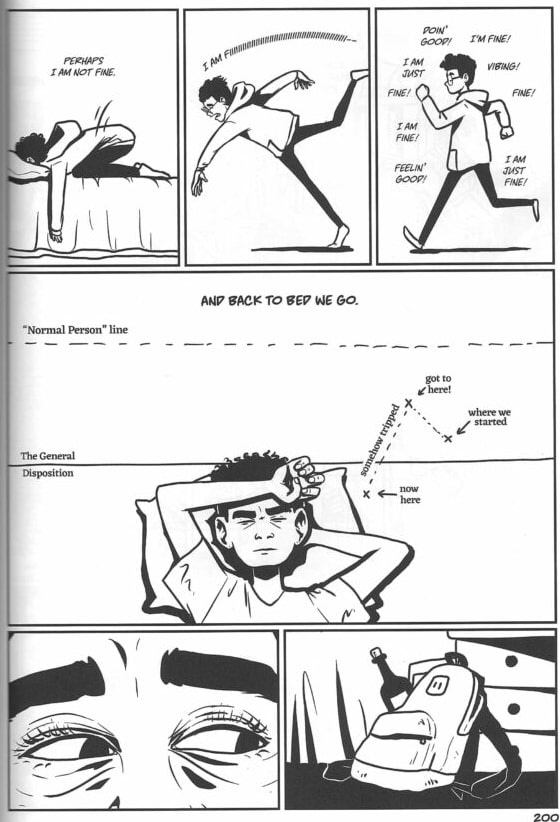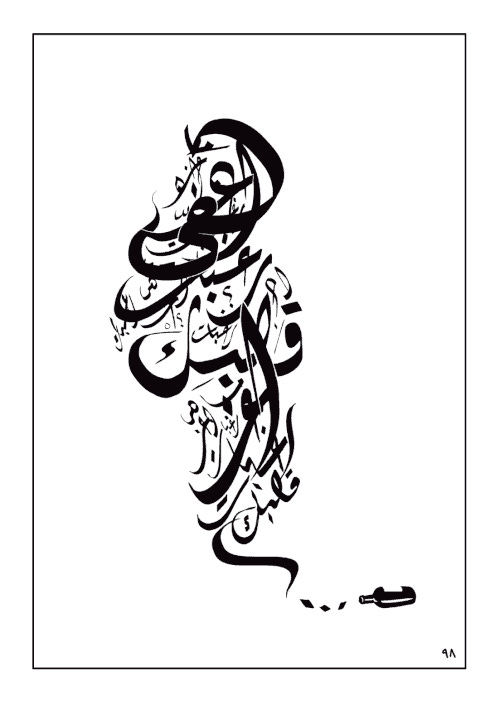Shubeik Lubeik: Wishful thinking
An Egyptian graphic novel gives "be careful what you wish for" a whole new meaning.
Shubeik Lubeik
By Deena Mohamed
Published by Pantheon Books, 2023
Buy it
It can be exciting to encounter work by someone who had previously been unknown in the world of English-language comics but who has a fully-formed style and a distinct point of view. Great work is regularly being published around the world, and we only get to experience the tiny sliver that gets translated, so when an excellent example of art and storytelling shows up on our shelves, it’s something to celebrate. That’s what we get with Shubeik Lubeik, a thick graphic novel from cartoonist Deena Mohamed that’s actually a collection of a trilogy of books that were originally published in Egypt.
Mohamed’s story posits a world in which magical wishes are a sort of natural resource that have become available for people to use (the title is an Arabic phrase that means “your wish is my command”). These wishes are semi-sentient beings that are contained in bottles or other containers, and they come in three classes. First-class wishes are the most powerful, and they’re likely to give people exactly what they want, which makes them very expensive. Second-class wishes are less powerful, and it seems like they’re mostly used for material gain. Third-class wishes are the cheapest options, but they’re likely to backfire, granting people’s desires in an ironic fashion.
All of this gets explained through exposition, providing an idea of the bureaucracy that has sprung up around wishes. They’re highly regulated, with people being required to obtain licenses and gain approval for different types of wishes. While a lot of this is clearly meant to be symbolic, it’s not a one-to-one allegory, although it provides some commentary on how richer countries exploit other countries, coming up with laws and regulations that allow them to obtain resources while maintaining tight control over how those resources are used. It’s a pretty sharp critique of geopolitics from the perspective of someone who probably watches with disgust at the behavior of the United States and its leaders (especially right now, as our disaster-in-chief is doing his best to destroy the global economy).
However, that’s all background; the book is really about the personal stories of a few people who get the chance to make some wishes and struggle to figure out how to use them correctly. The framework for the story involves a street vendor in Cairo who happens to have three first-class wishes that he wants to get rid of. He’s offering them at a discount, but they’re still pretty cost-prohibitive, so the common people who may get to use them will still have to save up a bunch of money in order to do so. We get three stories that delve into the psychology behind using wishes and the barriers that people face as they try to use them.
First, we follow Aziza, a woman who was married to Abdo, a guy who had spent most of his life dreaming about using a wish to get a brand-new Mercedes. We learn that he was an affable goofball who kind of drove Aziza crazy, but she still loved him. Unfortunately, he is killed in a car accident, and in her grief, Aziza decides to work extra hard so she can buy a wish and maybe use it to live out Abdo’s dreams as a way of remembering him.
At least, that seems like what she plans to do, but she struggles to get the chance to actually make a wish. When she goes to register the wish legally, she gets detained by the authorities, who claim that she must have stolen the wish or that she plans to use it for unauthorized purposes. She ends up caught in a legal morass, with the government refusing to allow her to use the wish that she rightfully owns. Their ultimate goal is to get her to turn over the wish to them, but they can’t simply confiscate it, because taking a wish away from its rightful owner causes it to lose its potency. So they just keep her in detention, hoping that she’ll eventually give in.
This makes for a nice look at the ways common people, and especially women, face oppression by the authorities in countries like Egypt. Aziza is a stand-in for the people who simply want to live their lives, but they end up struggling for years to assert their basic rights. She ends up relying on assistance from a non-governmental organization that provides legal aid, but while she manages to prevail, we learn later in the book that organizations like this are being forced to shut down due to government pressure. As in the real world, it’s hard to get people to care about the plights of actual people (and current events provide yet another example of this, as the evil billionaires who have seized control of the U.S. government have decided to end programs that provide life-saving foreign aid, supposedly because it’s not “efficient” enough, but really because they don’t care if people in other countries die).
This description may make it sound as if the story is about dry political issues, but it’s actually a fascinating exploration of human concerns. We see Aziza’s reliance on her inner strength as she soldiers on in memory of her husband, and the final revelation of what she had been planning to use the wish for is devastatingly sad. And that’s just the first of these stories!
The next story follows Nour, a non-binary college student who struggles with anxiety and depression. While they appear to have everything they need for success, they can’t seem to get their life together, and they are also unsure about how to get help for their mental health issues. Even though they have friends and family who are generally supportive, they can’t seem to overcome the idea that they shouldn’t be struggling so much because they have a pretty good life. So when they learn that the street vendor they visit regularly has a first-class wish for sale, they think that this might be the solution to all of their problems.
However, the solution to mental health issues isn’t that easy. As Nour looks at how the wish could be used, they realize that simply wishing away depression wouldn’t work. Sure, they could wish to always be happy, but that would likely mean that they would be stuck in an artificially positive mental state, unable to properly experience any emotions naturally. Thus, the story becomes about how to deal with mental illness, looking at how Nour learns coping skills, experiences setbacks, and eventually realizes that the solution requires ongoing work rather than a quick fix. It’s a really well-thought-out examination of what it’s like to live with depression, putting readers in the mind of a neurodivergent character who slowly builds an acceptance of themselves.
The third story follows Shokry, the street vendor, who has given up on selling his final wish and decides that he’s going to have to use it himself. When he learns that Shawqia, an elderly woman who visits his kiosk every day, is dying from cancer, he wants to use the wish to cure her. But she refuses to allow this, and he doesn’t understand why. As he keeps hounding her and trying to get her to agree to prolong her life, she eventually relents and tells him the story of her life, which involved her own use of a wish. It’s a dark, emotional tale, yet another example of Mohamed’s excellent grasp of character and her ability to deliver effective drama.
The storytelling is excellent throughout the book, with Mohamed’s art serving to bring her setting to life. As fantastical as some of the ideas are, she makes them seem mundane and commonplace, giving us a street-level view of regular life in this world, which isn’t so different from what we’re used to. She throws in a lot of background details to flesh things out, like people with extra ears or eyes as the result of wishes gone awry. She also gives her characters a lot of expressiveness, selling the emotions of what they’re going through and making them incredibly relatable.
The depictions of the wishes themselves are also fascinating. The cheap third-class wishes, which are sold in cans like soda, look like an awkward conglomeration of shapes, befitting their weird, disreputable nature. However, the first-class wishes take the form of beautiful shapes made out of Arabic lettering, with the suggestion of humanoid shapes that are kind of like genies. This makes for just one example of how fully realized this world is and how much thought Mohamed put into everything.
For anyone who is interested in the types of comics being made around the world, this book shouldn’t be missed. However, it’s also a great example of storytelling focused on the emotions and travails of regular people who are simply trying to navigate the dilemmas they face in their lives. As fantastical as the details may be, the characters are recognizable as regular people that readers can’t help but care about. That’s the mark of a good storyteller, one who can keep us interested in compelling human drama regardless of the crazy details surrounding them.










I absolutely adore this book. Nominated it for every possible award in 2023. This is a great review! I hope it gets more people to notice it.
"Oh Lord, won't you buy me/a Mercedes-Benz..."